-
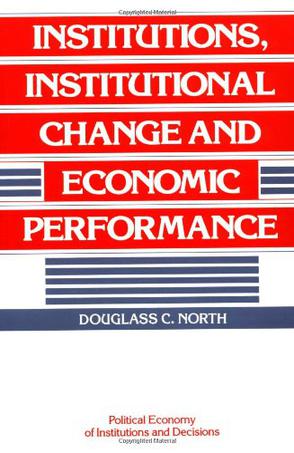
Institutions, Institutional Change and Economic Performance
Continuing his groundbreaking analysis of economic structures, Douglass North develops an analytical framework for explaining the ways in which institutions and institutional change affect the performance of economies, both at a given time and over time. Institutions exist, he argues, due to the uncertainties involved in human interaction; they are the constraints devised to structure that interaction. Yet, institutions vary widely in their consequences for economic performance; some economies develop institutions that produce growth and development, while others develop institutions that produce stagnation. North first explores the nature of institutions and explains the role of transaction and production costs in their development. The second part of the book deals with institutional change. Institutions create the incentive structure in an economy, and organisations will be created to take advantage of the opportunities provided within a given institutional framework. North argues that the kinds of skills and knowledge fostered by the structure of an economy will shape the direction of change and gradually alter the institutional framework. He then explains how institutional development may lead to a path-dependent pattern of development. In the final part of the book, North explains the implications of this analysis for economic theory and economic history. He indicates how institutional analysis must be incorporated into neo-classical theory and explores the potential for the construction of a dynamic theory of long-term economic change. -
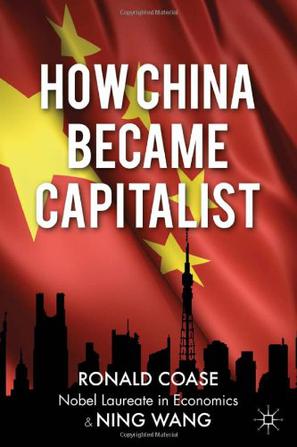
How China Became Capitalist
How China Became Capitalist details the extraordinary, and often accidental, journey that China has taken over the past thirty years in transforming itself from a closed agrarian socialist economy to an indomitable force in the international arena. The authors revitalize the debate around the development of the Chinese system through the use of primary sources. They persuasively argue that the reforms implemented by the Chinese leaders did not represent a concerted attempt to create a capitalist economy, but that the ideas from the West eventually culminated in a fundamental change to their socialist model, forming an accidental path to capitalism. Coase and Wang argue that the pragmatic approach of "seeking truth from fact" is in fact much more in line with Chinese culture. How China Became Capitalist challenges the received wisdom about the future of the Chinese economy, arguing that while China has enormous potential for growth, this could be hampered by the leaders' propensity for control, both in terms of economics and their monopoly of ideas and power. -
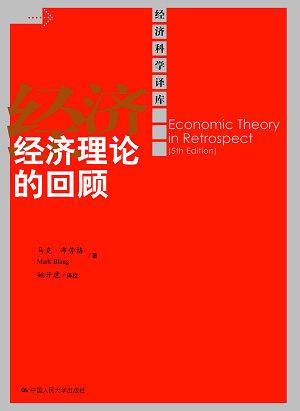
经济理论的回顾
本书描述了从亚当•斯密到凯恩斯,确切地说是从大卫•休谟到米尔顿•弗里德曼的经济学思想的历史,但这是一个不同的历史。 首先,这是关于经济学理论而不是关于经济学教条的历史,换句话说,它只注重理论分析。其次,它包括了具体的读者导读(Reader’s Guide),其内容涵盖经济学史上的九大重要著作,作者分别是亚当•斯密,李嘉图,穆勒,马克思,马歇尔,威克斯蒂德,威克塞尔,瓦尔拉斯和凯恩斯。这也是为了鼓励学生从一开始就对伟大经济学家的作品更加熟悉。 这本书该怎么读?答案是从头到尾。但是,这答案从来不能满足那些喜爱钻进书里,仔细一页一页浏览的读者。对那些读者,必须强调的是,书中的论点是逐渐建立起来的,另外后面的章节要用到前面几章介绍过的知识:书中有大量关于以前所介绍的内容的小结,没有一章是完全自给自足的。简而言之,这是本书用来学习经济学,学习“昨天的”和“今天的” 经济学。 第五版在原来7篇关于经济学著作的读者导读的基础上,添加了新的关于瓦尔拉斯的Elements of Pure Economics 和凯恩斯的General Theory of Employment,Interest and Money 的读者导读。另外对关于斯密,李嘉图和马克思的章节有少量但十分重要的附加内容,主要的附加内容都是关于边际生产力理论,一般均衡理论以及福利经济学的章节。关于现代宏观经济学的论述被大量修改,进一步阅读提示(Notes on Further Readings)也得到了修整和更新。 “据说只有一个马克•布劳格,经济思想史的老前辈。不过事实上有五位,而且每一个都比他前任更优秀。这本他巨著(magnum opus)的最新版——严谨而又充满智慧,虔诚而又打破常规,其不变的核心是充满着新的洞察力——是最好的一版。我不能想象一个学者的阅读文献中——或说一个学生的文献——没有它会是什么样。” ——Robert Heilbroner “当说到经济思想和理论史的研究时,马克•布劳格的《经济理论的回顾》是在过去30年的同类文献中分析最透彻,最具深度、广度,最具有学术意义的优秀的作品。从这种意义上来说,本书的新的,修订过的第五版的出现是特别有价值的。尽管该学科面临的来自数学分析方法的威胁有所消退,但危险可能来自其他新兴的经济学科。不过最令人放心的是,马克•布劳格的著作,作为经济思想史研究的支柱之一,会继续产生新的版本直至下个世纪甚至下个千年。” ——Terence Hutchison -
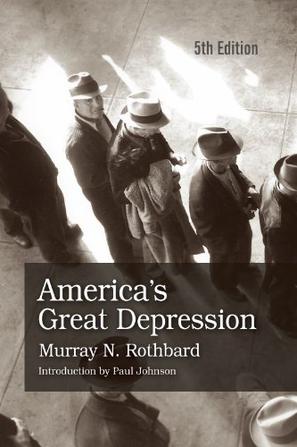
America's Great Depression
-

A Monetary History of the United States, 1867-1960
Writing in the June 1965 issue of the "Economic Journal", Harry G. Johnson begins with a sentence seemingly calibrated to the scale of the book he set himself to review: 'The long-awaited "Monetary History of the United States" by Friedman and Schwartz is in every sense of the term a monumental scholarly achievement - monumental in its sheer bulk, monumental in the definitiveness of its treatment of innumerable issues, large and small ...monumental, above all, in the theoretical and statistical effort and ingenuity that have been brought to bear on the solution of complex and subtle economic issues'.Friedman and Schwartz marshaled massive historical data and sharp analytics to support the claim that monetary policy - steady control of the money supply - matters profoundly in the management of the nation's economy, especially in navigating serious economic fluctuations. In their influential chapter 7, "The Great Contraction" - which Princeton published in 1965 as a separate paperback - they address the central economic event of the century, the Depression. According to Hugh Rockoff, writing in January 1965: 'If Great Depressions could be prevented through timely actions by the monetary authority (or by a monetary rule), as Friedman and Schwartz had contended, then the case for market economies was measurably stronger.' Milton Friedman won the Nobel Prize in Economics in 2000 for work related to "A Monetary History " as well as to his other Princeton University Press book, "A Theory of the Consumption Function" (1957). -
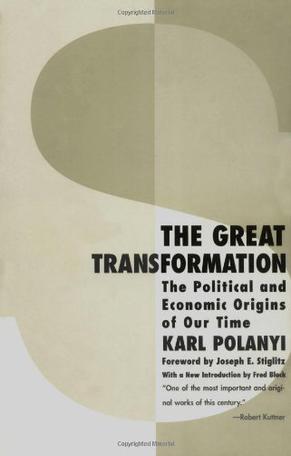
The Great Transformation
In this classic work of economic history and social theory, Karl Polanyi analyzes the economic and social changes brought about by the "great transformation" of the Industrial Revolution. His analysis explains not only the deficiencies of the self-regulating market, but the potentially dire social consequences of untempered market capitalism. New introductory material reveals the renewed importance of Polanyi's seminal analysis in an era of globalization and free trade.